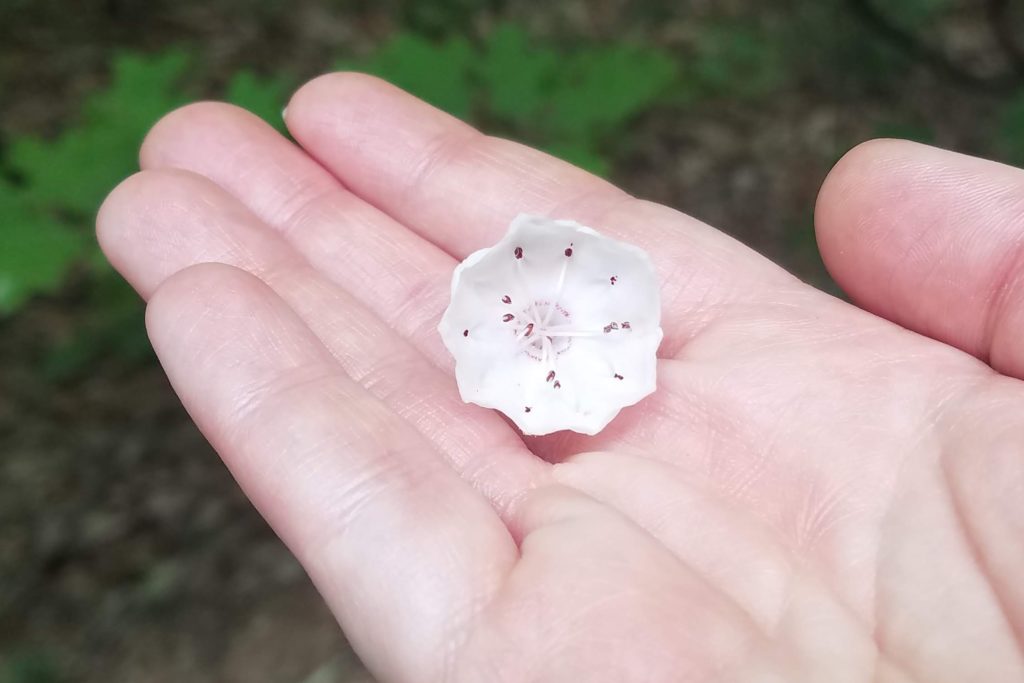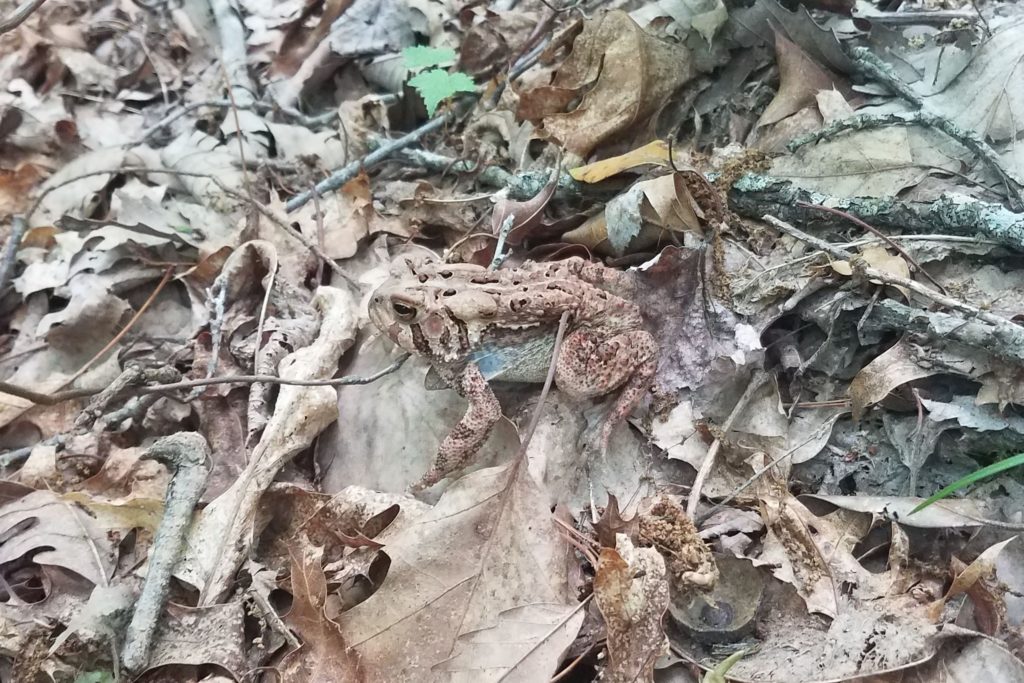Part 3: The Experience
A bunch of (largely) Type A people can sure cram a lot into a weekend of leisure, whether it’s physical activity or mental exercises. The second day of our three-day excursion started off with some pretty heavy reflection about ourselves, our comfort zones, and our relationship with nature vs. society.
Sunday, early:
I observed for the second morning in a row that it seemed to be harder to judge the light cycles in our canvas tent than in a nylon tent. I had never noticed that problem when camping in the open, but it’s possible that we just weren’t getting as much sunlight to start with because of where we were camped: in a valley with extensive tree cover blocking most of the light. When camping, I’m used to being wide awake at the first hint of the sun, but even without that natural alarm clock, I was still among the first three up every morning, the other two both being legitimate morning people.

I had disturbing dreams during the night about things that have been on my mind lately: work, house maintenance, and car problems to name a few. I wondered if my brain was trying to compensate for the lack of stress in my waking life. I am not sure if this is a documented response, but I have heard of busy people becoming more anxious in times of quiet relaxation.
No one else mentioned bad dreams, but several people said that they still had some trouble sleeping, though it was generally not as bad as the first night. I was interested to find that we had some divisions within couples regarding who needed noise in order to sleep. B needed a white noise machine at home, but even that was too much noise for her husband. Christian sleeps best with a TV show playing at home, but he takes ear plugs while camping because nature sounds keep him up. I prefer nature’s white noise, but I’m usually too sleep deprived for anything to keep me awake.
The slow, quiet morning was incredibly relaxing, despite not getting as much sleep as I had wanted. I sat next to the fire pit with my tea, listening to the birds and a very hoarse-sounding bullfrog. It was surprising to me how expansive the forest was, since we weren’t even in a big one, comparatively speaking. I never lost that sense of awe at the sheer amount of lush greenery the whole weekend. I wrote “It is so peaceful, and I am so happy.”
At this point, I couldn’t even remember where I put my phone, but I had already lost the urge to look for it or check Facebook. I was shocked at how quickly that addiction diminished in the absence of a cell signal – different from being at home, where fighting a phone addiction it is a constant act of will power.
As more people got up and we gathered for breakfast, some of us started to discuss the effects of nature on different personality types. Two big questions we asked were:
1: What is the difference of the three-day effect on introverts vs. extroverts; on people who are typically active vs. relaxed?
2: At what point do people in nature step away from the relaxation and start recreating the order they’re used to?

It had not occurred to me that while I was recharging my batteries by being on a trip with friends, some of those friends were draining their batteries by being in the same situation. Our biggest introverts on the trip, K and T, both said that they would need time to recover and relax after getting home because of so much concentrated interaction with other people.
K also observed that we weren’t really in nature, but rather a “tent city.” (I would have called it a “tent suburb.”) In this camp site, we had neighbors on either side. We could see if they were in camp and what they were doing, with only a few trees to obscure the view and nothing to block the noise. Therefore, he was not feeling a benefit of being removed from civilization. “People leave the city,” he said, “but they bring the city here with them.”
That statement was more accurate than any of us knew. My husband (the king of glamping, who packed a queen-size air mattress and a propane grill) is still recovering from ankle surgery. I asked him what he planned to do all day since he couldn’t go on long hikes with the rest of us, and since there was no internet that would allow him to watch YouTube or Netflix. He came prepared for that, having downloaded TV shows, movies, and music for his time alone in camp. His experience was not much different from how he’d spend a slow weekend at home, except for the fact that he was outside instead of inside. He clearly stated he was not expecting to feel the “three-day effect.”

We had a lot of readers in our group (all of the ladies are in a book club together), and in our discussions around removing ourselves from civilization and technology, we (K and I mostly) discussed some fascinating topics and related books, such as…
Shinrin-Yoku: The Art and Science of Forest Bathing by Qing Li:[1] Forest bathing consists of guided, meditative trips into nature. These aren’t long camping trips, but can still be healing and rejuvenating. This moving meditation is considered a component of preventative medicine in some parts of the world, especially in Japan.
We figured that the effects of nature vary from person to person based on many factors, including personality type (introvert vs. extrovert, fast- vs. slow-paced lifestyle). I wondered at what point removal from society, technology, and other people would become more anxiety-inducing, rather than anxiety-reducing? Of course, it would have to be a movable line, but I would imagine that everyone has his/her point of discomfort. D had a great response to that question, saying “I’d probably be a better person if I sat alone with my thoughts, but I can’t do that.”
A Separate Reality by Carlos Castaneda:[2] The conversation veered pretty quickly from the act of observing nature to becoming a part of nature. I have only read one of Castaneda’s books, but I have heard that they all touch on similar themes in his research, namely the experience of feeling and understanding the energies of different places and living things; not just communing with nature, but communicating with it on a level that we who are tied to society and routines simply cannot.
This line of discussion led K and me to dive into a tangent about some fringe topics, at which point we lost most of our fellow campers to their morning routines. We talked about things I hadn’t thought much about since anthropology classes in college, such as the use of ayahuasca, a ceremonial beverage with psychoactive properties, which is now making its way out of tribal applications and being used modernly in some cases as therapy for PTSD.[3]
We rounded out that topic with anecdotes about extreme phenomena such as group hallucinations and communication through dreams. I wondered how much more open I was to the reality of such concepts while being out in nature (with a relaxed prefrontal cortex) than I would have been at home, preoccupied by daily minutiae. That brought us back to our relationship to technology and order.
The Earth has a Soul by Carl Jung:[4] Jung talks about the concept that our technology has advanced at a pace faster than we have evolved to handle it on a psychological level. Our bodies and minds have a certain level of expectation for the presence of the natural world, and removal from it contributes to some of the psychoses we experience.
Deep (and dark) discussion ensued about whether or not we as a race can back off from our dependence on technology at this point. My thought was that it will not happen voluntarily, or at least not without some kind of major cataclysmic event (war, disease, civilizations collapsing, etc.) to take us back to living at the planet’s carrying capacity and living in greater harmony with nature. I feel the need to point out that I am not advocating any of these as a course of action, but rather recognizing them as a not-unlikely scenario. I have not seen Avengers: Infinity War, but I understand that the villain has a philosophy aligned with what was under discussion.
Player Piano by Kurt Vonnegut:[5] K asked how long it would be after such a cataclysmic event before someone starts rebuilding that troublesome technology again. Without giving too much away about this book, I recommended he read it. It’s an interesting examination of what technology and automation can mean for a society and where our comfort level is – what we can do without and what we can’t.
In that same vein, we were doing a decent job in camp of divvying up tasks and sharing responsibilities without much of a schedule or planning. In a short time, we really did set up a little society with glamping equipment and fancy food. It felt (to me) more like a vacation than camping, except that we went back to tents at the end of the day instead of a house.

I did not expect this post to run into four parts, but my friends certainly jammed a lot of content into what was supposed to be a leisurely morning chat. Next week I will get to the conclusion of our camping trip and reactions to our return to civilization.
Have you read any of the books we discussed? What is your take on some of these philosophies surrounding our connection with vs. separation from nature?
Thanks for reading!
[1] https://www.goodreads.com/book/show/36531628-shinrin-yoku
[2] https://www.goodreads.com/book/show/12839.A_Separate_Reality
[3] https://www.theguardian.com/science/blog/2017/apr/06/a-puke-bucket-and-an-ancient-drug-is-ayahuasca-the-future-of-ptsd-treatment-
[4] https://www.goodreads.com/book/show/123633.The_Earth_Has_a_Soul
[5] https://www.goodreads.com/book/show/9597.Player_Piano
0 Comments